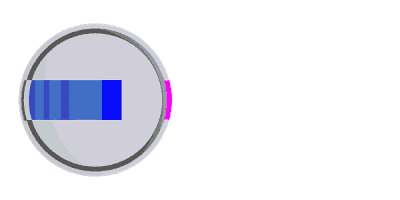ഗൊയിയാനിയ അപകടം
| തിയതി | 13 September 1987 |
|---|---|
| സ്ഥലം | Goiânia, Goiás, Brazil |
| നിർദ്ദേശാങ്കങ്ങൾ | 16°40′29″S 49°15′51″W / 16.6746°S 49.2641°W See also § Contamination locations |
| തരം | Nuclear Accident |
| കാരണം | Theft of radiation source from abandoned hospital |
| Participants | Roberto dos Santos Alves Wagner Mota Pereira Devair Alves Ferreira (and relatives) |
| അനന്തരഫലം | INES Level 5 (accident with wider consequences) |
| മരണങ്ങൾ | 4 |
| Non-fatal injuries | 249 contaminated |

A.) an international standard source holder (usually lead),
B.) a retaining ring, and
C.) a teletherapy "source" composed of
D.) two nested stainless steel canisters welded to
E.) two stainless steel lids surrounding
F.) a protective internal shield (usually uranium metal or a tungsten alloy) and
G.) a cylinder of radioactive source material, often but not always cobalt-60. In the Goiânia incident it was caesium-137. The diameter of the "source" is 30 mm.
1987 സപ്തംബർ 13 ന് ബ്രസീലിയൻ സംസ്ഥാനമായ ഗൊയസിലെ, ഗൊയിയാനിയയിൽ നടന്ന ഒരു റേഡിയോ ആക്ടീവ് അപകടം ആണ് ഗൊയിയാനിയ അപകടം. 1985 ൽ ബ്രസീലിലെ ഗൊയിയാനിയ എന്ന സ്ഥലത്തെ റേഡിയോതെറാപ്പി ഇൻസ്റ്റിറ്റ്യൂട്ട് ഒരു പുതിയ സ്ഥലത്തേക്കു മാറ്റിയപ്പോൾ ഉപേക്ഷിക്കപ്പെട്ട റേഡിയോ തെറാപ്പി സ്രോതസ്സിൽ നിന്നുള്ള ആണവമലിനീകരണം കാരണമാണ് അപകടം ഉണ്ടായത്. പിന്നീട് പല ആളുകളും ഇത് കൈകാര്യം ചെയ്തു. അതിൻറെ ഫലമായി മാരക വികിരണമേറ്റ് 5 പേർ മരിച്ചു. ഒട്ടേറെ പേർക്ക് അസുഖം ബാധിച്ചു. 249 പേരുടെ നില ഗുരുതരമായിരുന്നു. 112,000- ത്തിൽപ്പരം ആളുകൾ നിരീക്ഷണത്തിലായി. കൂടുതൽ ആളുകളുടെ ശരീരത്തിൽ റേഡിയോ ആക്ടീവ് വസ്തുക്കൾ കണ്ടെത്തുകയുണ്ടായി.[1][2]
ബ്രസീൽ സർക്കാർ പ്രദേശത്ത് ജാഗ്രത പാലിച്ചു. പലയിടത്തെയും മേൽമണ്ണ് നീക്കംചെയ്തു. നഗരത്തിലെ കനത്ത വികിരണമേഖലയിൽ ഉണ്ടായിരുന്ന 40 വീടുകൾ നശിപ്പിച്ചു. ധാരാളം ആളുകൾ ഭയത്താൽ ചികിൽസ തേടി. ഗൊയിയാനിയയിൽ നിന്നുമുള്ള ആൾക്കാരെയും വസ്തുക്കളെയും ബാക്കിപ്രദേശങ്ങളിൽ ഉള്ളവർ ബഹിഷ്കരിക്കുന്ന നിലവരെയെത്തി. സർക്കാരിന്റെ ഫലപ്രദമായ ഇടപെടൽ വേഗത്തിൽ കാര്യങ്ങൾ നിയന്ത്രണവിധേയമാക്കിയതിനാൽ കൂടുതൽ അപകടമുണ്ടാകാതെ കാര്യങ്ങൾ വരുതിയിലായി. ലോകത്തിലെ ഏറ്റവും മോശമായ ആണവ ദുരന്തങ്ങളിലൊന്നായി ഈ അപകടത്തെ കണക്കാക്കുന്നതായി ടൈം മാസിക കണ്ടെത്തി. അന്താരാഷ്ട്ര ആണവോർജ്ജ ഏജൻസി ഇത് "ലോകത്തിലെ ഏറ്റവും മോശമായ റേഡിയോളജിക്കൽ സംഭവവമായി വിലയിരുത്തി.[3][4]
ഉറവിടത്തിന്റെ വിവരണം
[തിരുത്തുക]ഗൊയിയാനിയ അപകടത്തിനു കാരണമായ റേഡിയേഷൻ സ്രോതസ്സ് 93 ഗ്രാം (3.3 oz) റേഡിയോആക്റ്റീവ് സീസിയം ക്ലോറൈഡിന്റെ (a caesium salt made with a radioisotope, caesium-137) ഒരു ചെറിയ കാപ്സ്യൂൾ ആയിരുന്നു. ഇത് ലെഡ്, സ്റ്റീൽ എന്നിവകൊണ്ടു നിർമ്മിച്ച ഉറവിടം ചലിക്കുന്നതിനായി ചക്രമുള്ള ഒരു പെട്ടിക്കുള്ളിൽ സൂക്ഷിച്ചിരുന്നു. ചക്രം അകത്തേയ്ക്ക് തിരിയുമ്പോൾ സ്റ്റോറേജിനും റേഡിയേഷൻ സ്ഥാനങ്ങൾക്കും ഇടയിൽ സ്രോതസ്സ് നീങ്ങുന്ന തരത്തിലാണ് സൂക്ഷിച്ചിരുന്നത്.[1][5]
| Goiânia source | TBq |
|---|---|
| 1971 | 74 |
| 1987 | 50.9 |
| Recovered | 44 |
| Unrecovered (c. 1987) | 7 |
| Unrecovered (c. 2016) | 3.5 |
| Smoke detector | 0.000000037 |

ഇതും കാണുക
[തിരുത്തുക]അവലംബം
[തിരുത്തുക]- ↑ 1.0 1.1 The Radiological accident in Goiânia (PDF). Vienna: International Atomic Energy Agency. 1988. ISBN 92-0-129088-8.
- ↑ Foderaro, Lisa (July 8, 2010). "Columbia Scientists Prepare for a Threat: A Dirty Bomb". The New York Times.
- ↑ "The Worst Nuclear Disasters - Photo Essays". TIME.com. Retrieved 20 October 2018.
- ↑ Yukiya Amano (March 26, 2012). "Time to better secure radioactive materials". Washington Post.
- ↑ https://children.manoramaonline.com/padhippura/cesium-blue-stone-in-brazil-caused-accidental-poisoning.html
<ref> റ്റാഗ് "puig" എന്ന പേരോടെ <references> എന്നതിൽ നിർവചിച്ചിട്ടുണ്ടെങ്കിലും ആദ്യ എഴുത്തിൽ ഉപയോഗിക്കുന്നില്ല.